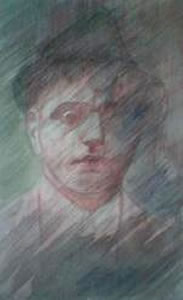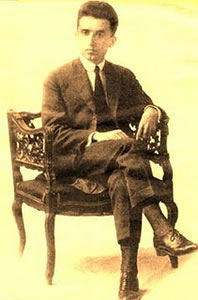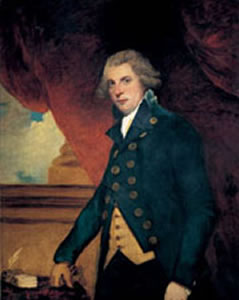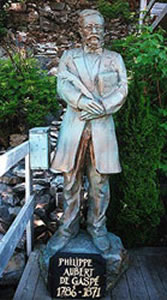|
De Duitse dichter Georg Heym werd geboren op 30 oktober 1887 in Hirschberg. Zie ook mijn blog van 30 oktober 2006 en ook mijn blog van 30 oktober 2008 en ook mijn blog van 30 oktober 2009.xml:namespace prefix = o ns = "urn:schemas-microsoft-com:office:office" />
Allerseelen I
Geht ein Tag ferne aus, kommt ein Abend.
Brennt ein Stern in der Höhe zur Nacht.
Wehet das Gras. Und die Wege alle
Werden in Dämmrung zusammengebracht.
Viele sind über die Steige gegangen.
Ihre Schatten sind ferne zu sehn,
Und sie tragen an schwankenden Stangen
Ihre Fackeln, die wandern und wehn.
Mauern sind viele, und Gräber, und wenige Bäume.
Manche Tore darin, wo der Lorbeer trauert.
Viele sitzen in Haufen über den Kreuzen,
Ihre Lichter behütend, wenn der Regen schauert.
Und ein Rot steckt im Walde, dürr wie ein Finger,
Wo der Abend hänget in wolkiger Zeit
Mit dem wenigen Licht. Und geringer
Rings ist das Nahe, und die Weite so weit.
Doch ewig ist der Wind, der nimmer schweiget
In dunklem Lande, herbstlich schon erbraunet,
Der dunkle Bilder viel vorüber zeiget
Und dunkle Worte flüchtig trübe raunet.
Absolution
Bin der Liebsten nachgeschlichen
Durch die dunkle Kirchenpforte.
War sonst selten, ach recht selten
An dem düstren, heilgen Orte.
Im Stuhle saß ein alter Mönch.
Dem trug sie ihre Sünden vor.
Ach, ihre lieben, jungen Sünden
Sagt' sie dem Greise in das Ohr.
Der Priester macht' ein bös Gesicht
Ob soviel Teufelssünden.
Sosehr sie weint' und schluchzte auch,
Er mocht sie nicht entbinden.
Da trat ich hinter ihr herfür.
Der Pfaffe fiel vor Schreck vom Stuhl.
Als ich sie trug zur lichten Tür,
Wünscht' er sie in den Höllenpfuhl.
Ein staubges Heiligenbild fiel um
Ob unserm großen Frevel.
Als ich die Tür ins Schlosse warf,
Da stank es gar nach Schwefel.
Doch draußen in dem Sonnenlicht
Da küßt ich auch mein Mädchen schon
Und gab der lieben Sünderin
Mit einem Kuß Absolution.

Georg Heym (30 oktober 1887 16 januari 1912)
De Griekse dichter en schrijver Kostas Karyotakis werd geboren op 30 oktober 1896 in Tripolis. Zie ook mijn blog van 30 oktober 2008 en ook mijn blog van 30 oktober 2009.
Return
In your current is the laughter of the gods,
Saronica immortal, the blessing of our ship,
like your deep calm, and just as deep the tempest
we'd have heard here.
Beneath the hoar-frost, body damply torpid,
the dove that's Athens shivers,
is enraptured, and awaits the distant sunrise
like a bride.
Where the clouds clear, there the sky is Pegasus' flank,
as fair as the fate of the Parthenon;
Zeus inverts a glass to spill the
flood of dreamlight.
Prodigal, I arrive a child again to you, to bend
before the breeze just like a flower;
earth, sky, and sea of Attica, to you I'll always
owe the Song!

Kostas Karyotakis (30 oktober 1896 21 juli 1928)
De Tsjechische dichter, schrijver, essayist en vertaler Michal Ajvaz werd geboren op 30 oktober 1949 in Praag. Zie ook mijn blog van 30 oktober 2008.
Uit: The Other City (Vertaald door Gerald Turner)
"I entered one of the narrow aisles. For a while I proceeded in darkness, which was illuminated here and there by the glow of putrefying books. I switched on my torch and let the beam wander over the bookshelves. In the damp air the pages of books curled, swelled, frayed and turned to pulp, expanding and forcing the bindings outwards, tearing them and squeezing out through the holes
. What was most nauseating in these stuffy and fetid surroundings was not the realization that a strange accidental calamity was occurring with the rampant nature devouring the fruits of the human spirit; what gave rise to increasing anxiety was rather the fact that the dreamlike transformation of books into dangerous and unemotional vegetation laid bare the malignant disease secretly festering in every book and every sign created by humans. I read somewhere that books treat solely of other books and that signs likewise refer to other signs; that a book has nothing to do with reality, but instead reality itself is a book since it is created by language. What was depressing about that doctrine was that it allowed reality to be hidden by our signs."

Michal Ajvaz (Praag, 30 oktober 1949)
De Ierse schrijver en politicus Richard Brinsley Sheridan werd geboren in Dublin op 30 oktober 1751.
Sheridans vader Thomas was enige tijd manager en acteur bij het Theatre Royal in Dublin. Zijn moeder Frances was schrijfster. Zij stierf toen Richard 15 was. Sheridan ontving zijn opleiding in Harrow en zou rechten gaan studeren. Zijn romantische schaking van Elizabeth Linley en hun huwelijk in 1773 maakte een eind aan die plannen. In Londen begon hij voor het toneel te schrijven. Zijn eerste stuk, The Rivals, ging in 1775 in première in Covent Garden. Het stuk werd echter geen succes. Sheridan koos vervolgens een andere acteur voor de hoofdrol, waarna het een onmiddellijk succes werd, en zijn naam gevestigd was. Zijn beroemdste werk is The School for Scandal (1777), welke wordt beschouwd als een van de grootste Engelstalige komedies. Het werd gevolgd door The Critic (1779), als reactie op het satirische stuk The Rehearsal van George Villiers.
Uit: St. Patrick's day, or, the scheming lieutenant
Enter LIEUTENANT O'CONNOR.
O'Con. Well, honest lads, what is it you have to complain of?
Sol. Ahem! hem!
Trounce. So please your honour, the very grievance of the matter is this:ever since your honour differed with justice Credulous, our inn-keepers use us most scurvily. By my halbert, their treatment is such, that if your spirit was willing to put up with it, flesh and blood could by no means agree; so we humbly petition that your honour would make an end of the matter at once, by running away with the justice's daughter, or else get us fresh quarters,hem! hem!
O'Con. Indeed! Pray which of the houses use you ill?
1 Sol. There's the Red Lion an't half the civility of the old Red Lion.
2 Sol. There's the White Horse, if he wasn't case-hardened, ought to be ashamed to show his face.
O'Con. Very well; the Horse and the Lion shall answer for it at the quarter sessions.
Trounce. The two Magpies are civil enough; but the Angel uses us like devils, and the Rising Sun refuses us light to go to bed by.
O'Con. Then, upon my word, I'll have the Rising Sun put down, and the Angel shall give security for his good behaviour; but are you sure you do nothing to quit scores with them?
Flint. Nothing at all, your honour, unless now and then we happen to fling a cartridge into the kitchen fire, or put a spatterdash or so into the soup; and sometimes Ned drums up and down stairs a little of a night.
O'Con. Oh, all that's fair; but hark'ee, lads, I must have no grumbling on St. Patrick's Day; so here, take this, and divide it amongst you. But observe me now,show yourselves men of spirit, and don't spend sixpence of it in drink.
Trounce. Nay, hang it, your honour, soldiers should never bear malice; we must drink St. Patrick's and your honour's health.
All. Oh, damn malice! St. Patrick's and his honour's by all means.
Flint. Come away, then, lads, and first we'll parade round the Market-cross, for the honour of
King George.

Richard Sheridan (30 oktober 1751 - 7 juli 1816)
Portret door Joshua Reynolds, 1788-89
De Canadese dichter en schrijver Phillipe Aubert de Gaspé werd geboren op 30 oktober 1786 in Quebec. Zie ook mijn blog van 30 oktober 2006. Zie ook mijn blog van 30 oktober 2008.
Uit: Mémoires
Il y avait jadis une femme nommée Fanchette : cétait une gaupe, sans ordre sil en fût, qui laissait tout traîner dans son ménage. Aux reproches quon lui faisait, elle répondait constamment : « Jai oublié de le mettre dans le coin ; mettez-le dans le coin. » Le pauvre coin nen pouvait plus, encombré quil était de ce quelle y avait accumulé depuis vingt ans.
Si un de ses marmots se cassait le nez et poussait des cris pitoyables en le tenant à deux mains, Fanchette prenait lenfant dans ses bras et lui disait pour le consoler : Ne pleure pas, mon amour, jai oublié de mettre cette satanée bûche, qui ta fait tomber, dans le coin.
Sa fille aînée, sortant un jour de sa chambre, en toilette de bal et les cheveux poudrés à blanc, saccroche les pieds sur un baquet, tombe la tête dans un seau rempli deau sale, quelle renverse sur elle, et se retire passée à lempois depuis la tête jusquaux pieds en pleurant comme une Madeleine. Sa mère laisse sur le foyer une poêle pleine de graisse bouillante ; court à sa fille et lui dit : Ce nest rien, ma chère miche : jai oublié de mettre ce chien de baquet et ce diable de seau dans le coin.
Le grand-père, affligé dune vue basse, accourt au bruit, tombe assis au beau milieu de la friture, crie comme un sauvage douillet que ses ennemis font rôtir ; et pendant que sa fille lécorche comme une anguille en voulant décoller la partie de la culotte qui adhère à la peau du lâche martyr, Fanchette ne cesse de répéter pour le consoler : Cest ma faute, bon papa, jai oublié de mettre ma poêle dans le coin......... de la cheminée ; je ny manquerai pas une autre fois.

Phillipe Aubert de Gaspé (30 october 1786 29 januari 1871)
Standbeeld in Saint-Jean-Port-Joli in Quebec
|



